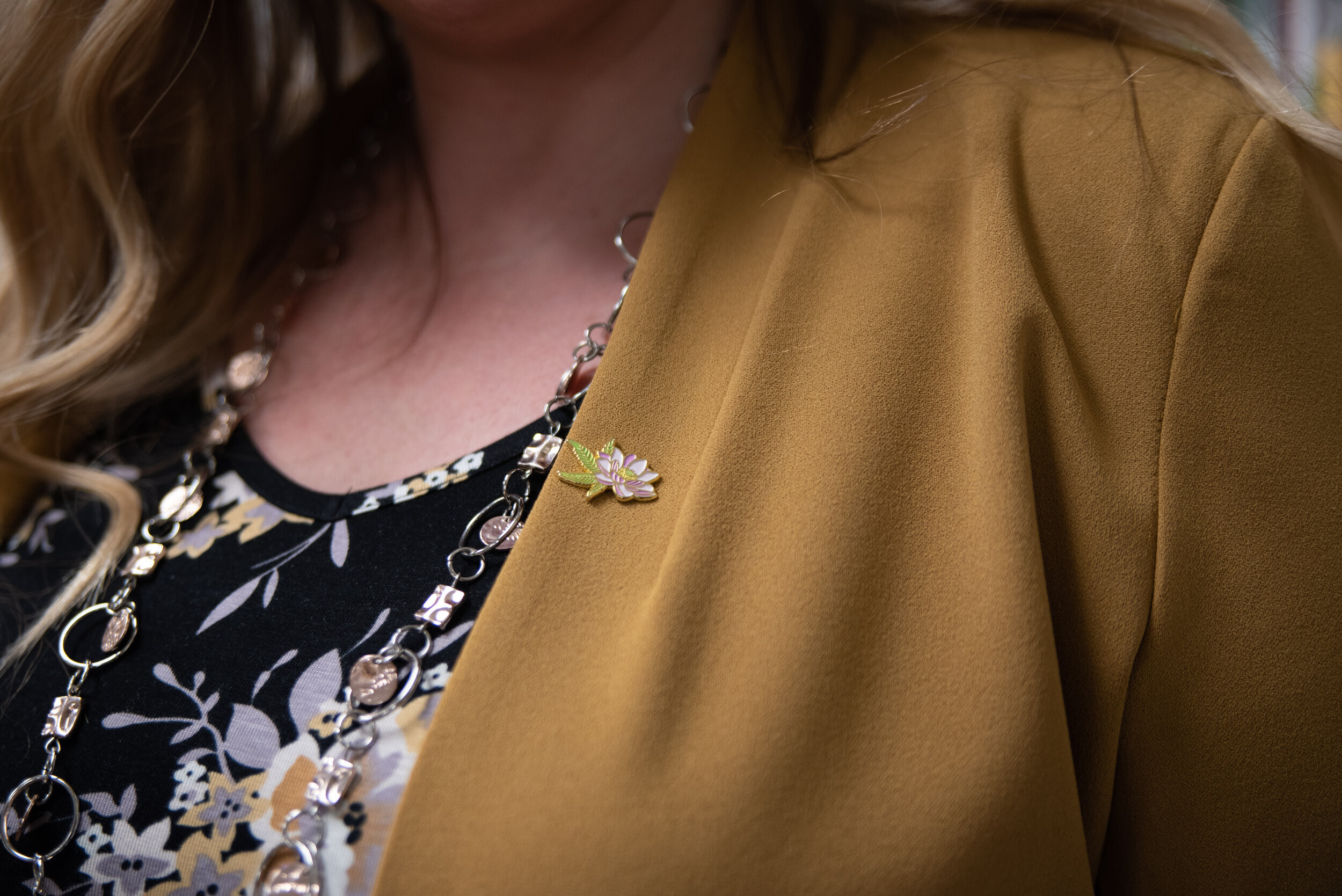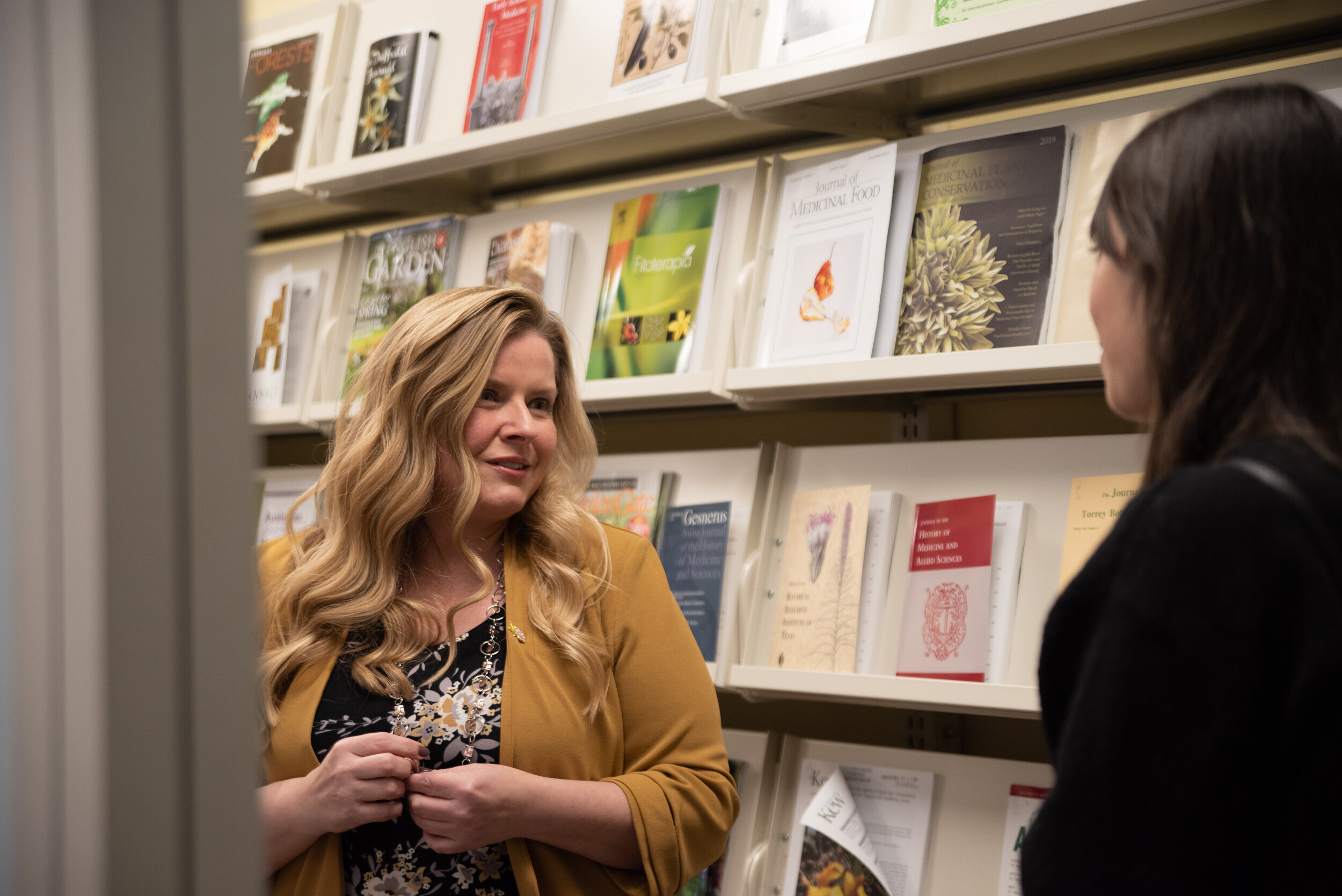Lotus Health’s Teaera Roland Talks Cannabis: ‘This is science.’
Interview by Sarah Urmston. Photography by Moriah Kenton.Teaera Roland has never been afraid to go against the grain. We met with the founder of Lotus Health L.L.C. on a rainy afternoon at the Lloyd Library, a place filled with science, history, and education – all elements that inspire her research. Teaera has a lot of letters behind her name, which translate to say she’s a board-certified family nurse practitioner and registered nurse with a master’s in nursing and experience in critical care medicine – in other words, she knows her stuff. Alongside Teaera was her colleague, Kim Cornell, a certified medical assistant who fights to treat the whole patient – not just throw a pill at the problem.
Teaera specializes in cannabinoid medicine – often working with folks who are battling addictions to other substances. She opened Lotus Health when she recognized a need to treat patients holistically and search for the why’s behind their problems. Teaera set out to not only treat her patients as wholly human, but to use science as the backbone of her work as she challenges stereotypes. In everything that comes her way, Teaera never stops asking why.
What made you so passionate about this kind of work?
It started when I was a brand new nurse, actually. I was working in critical care at a hospital and I had a patient, an older gentleman, whose wife was giving him something. I walked in and I said, “What are you giving him?” and she said, “A pot brownie.”
I was like, “Okay,” and I left, and I couldn’t believe it. The more I saw, the more I wanted to see. And that was it.
When I was in graduate school, most of my projects were cannabis-based. When I was in hospital administration, I was like, “All right, it’s coming. It’s coming! We need to start developing our policies and procedures now; we need to start getting into it now.” And [management and legal departments] would laugh at me.
But now, the biggest gap I see is the healthcare providers. We weren’t taught any of this. We didn’t know that there’s this whole other system in our body that controls every other system in our body.
So seeing a patient take a pot brownie just spiraled into seeking out this whole plethora of information you didn’t have or hadn’t learned before?
In all fairness, I’ve always been one to go against the grain. I’ve always questioned everybody. The way my brain works, I have to know why. So I just started digging, and I couldn’t believe what I was finding. I knew about cannabis, obviously, but I didn’t know the history or why it was taxed to begin with to make it “bad.”
That’s why I always say, “medical cannabis, medical cannabis, medical cannabis.” I use the term “cannabis” because that’s the name of the plant. But our system is called the endogenous cannabinoid system. We didn’t discover our own cannabinoids until after we were looking to see why cannabis works.
We have nothing if we don’t have the right to do what we think is right for ourselves.
We knew cannabis worked. We just didn’t know why. We discovered we actually make our own cannabinoids, and then we discovered the actual receptors. So we kind of backed into this particular knowledge.
What is your personal motive for wanting to bring cannabis into this health and holistic space for patients?
It’s not about necessarily bringing cannabis into it. It’s about bringing a higher understanding of the endocannabinoid system and what we can do to stabilize our own. I’ve done that in other areas that I practice, as well, like mental health: There’s a reason that we feel the way that we do. There are chemicals in our body that tell us how to feel; [it’s about] trying to find what exactly is off before just throwing drugs at people.
If you don’t have enough of this neurotransmitter, your body is going to compensate with another neurotransmitter. So, until we fix this, you're going to keep failing or falling off the wagon, and we have a culture that says we can treat you like crap because you have addiction issues. We have to separate culture from science.
Can you talk to me a bit about Lotus Health and how that was born?
Lotus started a few years ago. I’ve always known this is what I wanted to do: to have my own practice. The Lotus flower is a flower that grows up through mud; it grows from where you’re not supposed to be able to grow. So in a lot of cultures, it symbolizes rebirth and restarting; it’s being able to go through everything and still bloom.
What would you say are some of Lotus’s core values?
Patient rights. Even if I don’t agree personally with what somebody chooses to do, we have nothing if we don’t have the right to do what we think is right for ourselves.
I know that ice cream is poison. I know scientifically that dairy is bad for us. But it’s my right to eat ice cream if I want it, and I do. It’s my choice that I made.
How am I any better than somebody else who’s addicted to something else because society says they’re lower than me? I’m not. So, it’s just a matter of understanding from a scientific perspective: What is addiction? What is desire? And how do you take all of those aspects and help somebody be the best that they can be? Currently, I’m the best that I can be with ice cream. Everybody is always a work in progress.
What’s rewarding about this work?
They’re off their drugs. We have clients [that come in] in wheelchairs or have canes and they’re miserable and depressed. Then this year, they come strollin‘ in and they’re just like, “Hey!”
Last month, my daughter was hit by an S.U.V. while walking across the street; [it was] going 35 miles per hour. She had a brain bleed and over 200 fractures in her head and cardiac trauma; the first thing [we did was] give cannabis. She had just turned 15. And now, she’s back at school and fine.
How do the surgeons and the doctors react in those moments?
We had some interesting reactions because I told them what I was doing. This very nice neurotrauma provider came into the room with the pharmacist to explain to me how I really can’t be doing what I was doing because it’s against their policy.
But I was really nice, and I said, “While I appreciate your policy, I go by science. I do offer courses where you can actually get credit for coming to learn about the science of the inner-cannabinoid system and brain trauma. Let me know, and I’ll get you in.”
How is your daughter now?
I mean, she’s already getting on my nerves again as a teenage girl, so, she’s good. [Laughs.]
Do you have limits on what you might recommend to someone?
Oh yeah. So, I’m going to follow the law. And there’s a limit to the time that I’ll spend. If people want advice, I’ll give them advice, and they don't have to take it.
I won’t do anything until I know why. I treat people as though they’re not stupid, and explain to them this is why I’m suggesting this: “This is why you have to take vitamin D with fat; this is why you get sad in the winter; this is why this happens.”
The Lotus flower is a flower that grows up through mud; it grows from where you’re not supposed to be able to grow.
You can’t fix everything. At the end of the day, I just want to have contributed a little bit more than I took. Obviously I’m not perfect and I do things I’m not supposed to all the time. So I’ll say, “It’s okay that I just cussed that guy out in traffic because that other girl’s cancer doesn’t show up anymore!” [Laughs.]
[Teaera’s colleague Kim jumps in.]
Kim: So, I have a rare immune auto disease and I was sick for 18 years. No one knew what to do with me. I did everything I could think of: seven doctors by the time I turned 20. It was just an overlooked thing, and there was always a pill for it.
I was like 21, 22, and by 7 p.m., I’d go through 15, 20 different kinds of pain pills and injections. Without this medicine, I would’ve been 30 years old going to a pain clinic and getting judged for all my pain scripts. It’s just all about communication and education, because I didn’t know.
What are some of the challenges of doing this work for you both?
Kim: In Mason: the stigma. I can’t tell you how many times patients will walk in and they’re like, “I thought Bob Marley would be playing in the background…”
Teaera: “...and there’d be tie-dye on the walls! Not molecular charts!”
Kim: We like to have fun, but it’s medicine. This is our job. Sometimes people will just label you based on your title. That’s why Teaera calls her degrees her receipts.
Teaera: I think the law is written in a way to purposefully promote stigma. There are enough people to help, so what can do to decrease the stigma together? That’s when we joined Stillwater Medicine. At the time they were a small practice, so I started researching them a bit and I thought, “These guys are actually on our playing field.”
We actually ended up altering each other's programs; we’re using each other’s information and experiences to develop even better programs.
Some of the challenges have been: You’re targeted for certain things. It’s not like I’m quiet about what I do, and not a lot of people like the truth because the truth can interfere with their profit. But one of the coolest things I heard (and that’s helped a lot): A few years ago, I was doing a class for American Black Nurses Association and I was teaching about cannabis and medicine and the history of it. This older nurse [who] had been a nurse for over 60 years actually asked the question after the lecture, “What challenges have you had?”
And I said, “Well, I make a lot of people mad. You know, healthcare organizations – you get threatened, like, “You’ll never work here again!”
What is addiction? What is desire? And how do you take all of those aspects and help somebody be the best that they can be?
And she kind of smiled and said, “Nobody that ever made a difference in this world didn’t have those enemies. If you’re not making somebody mad, you’re not making any changes.”
We did the Council on Aging last year and we gave a lecture to hundreds and hundreds of healthcare providers. And they see me walk in wearing a business suit, and I don’t look like I would be talking about this stuff. I go up and I say that this is not a religion you choose to believe in or not – we’re past that. This is science. So if you don’t know what you’re talking about, that’s perfectly okay, but you should keep your mouth shut because you’re going to look really dumb when everyone finds out.
Did this spark conversation with any of those healthcare providers?
Oh yeah. We had anger; we had someone who stood up and slammed her hands down. She wasn’t angry at me; she was angry at other people there. There are nurses who are like, “We could have been doing this the whole time?” They’re humans, too. They have cancer; they have autoimmune diseases; they have M.S.
What would you tell young women who are interested in pursuing this same kind of path?
Pursue anything you’re passionate about. Keep asking questions. Always ask why.
I’m personally thankful that I was able to figure out at a young enough age that money doesn't buy happiness, and you cannot put a price tag on another human being allowing you to be a part of their life. Find what your passion is and let money be secondary. I’m a huge believer that if you give what you can, you’ll get what you need.
Don’t let anybody hold you back. When something stops in one way, you just find another way. Collateral circulation – the heart does it all the time. When the heart gets blocked in one area, your body will grow other circulation around the block. I think it’s the same with your life.
Who is the most influential woman in your life and why?
I think that’s liquid. I think that different women have done things to inspire me in different ways. A lot of my patients will inspire me to keep going. I really like scientific women; I like women who go against the grain; I like women who fight for what they believe in – even if it’s not what I believe.




